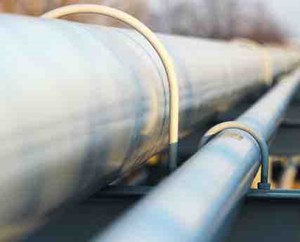Michigan Agency to Include Climate in Tunnel Permit Review
(AP) — A Michigan agency delivered a split decision on April 21 in a high-stakes battle over a pipeline that carries oil beneath a channel that connects two of the Great Lakes.
The Michigan Public Service Commission is considering Enbridge Inc.’s application to replace the section of its Line 5 that runs beneath the Straits of Mackinac. The new segment would be housed in a proposed underground tunnel.
The company reached a deal with former Republican Gov. Rick Snyder in 2018 to build the $500 million tunnel. Enbridge has obtained permits from the Michigan Department of Environment, Great Lakes and Energy but still needs them from the state Public Service Commission and the U.S. Army Corps of Engineers.
The commission said Wednesday that in evaluating whether to issue a permit, it would not pass judgment on whether the entire 645-mile (1,038-kilometer) line that runs across northern Michigan and Wisconsin should keep operating.
Environmental activists and Native tribes who oppose Line 5 had urged the commission to consider that question, contending the entire pipeline is a hazard.
The agency said instead it would focus only on the 4-mile-long (6.4-kilometer-long) section that crosses the straits connecting Lake Michigan and Lake Huron.
“The issue of public need for the pipeline has been a long-settled matter since the pipeline was first approved in 1953,” it said.
But the commission sided with pipeline opponents by ruling that emissions of climate-warming gases would be among factors it considers in determining whether to issue the permit.
Line 5 daily carries about 23 million gallons (87 million liters) of crude oil and natural gas liquids from Superior, Wisconsin, to Sarnia, Ontario. When burned, such fossil fuels emit carbon dioxide and other greenhouse gases.
The commission said it was required under the Michigan Environmental Protection Act to consider not only pollution from building the tunnel and new pipeline segment, but also from the petroleum liquids they transport.
The agency didn’t say how much weight it would give that issue in determining whether to grant the permit but said it would welcome evidence.
“They recognize these gases are a pollutant and impact the environment because they contribute to climate change,” said Margrethe Kearney, senior attorney with the Environmental Law & Policy Center, which opposes the pipeline. “This creates a hurdle that Enbridge has to address.”
Enbridge said in a statement it would provide information on the matter as the commission requests it.
“Our aim is simple,” the company said. “To replace the two pipelines in the straits with an even safer pipeline encased in a concrete tunnel well below the lakebed.”
Whitney Gravelle, chairwoman of the Bay Mills Indian Community, said she was disappointed that the commission declined to consider whether Line 5 threatens treaty-granted tribal fishing rights in area waters.
“The decision turned a blind eye toward consideration of tribal nations, which will be most impacted by this tunnel proposal,” Gravelle said.
Michigan Gov. Gretchen Whitmer has revoked a 1953 state easement that allowed the pipeline to run beneath the straits wants the line shut down by May 12. Enbridge is contesting her order in federal court.
Related News
From Archive

- Glenfarne Alaska LNG targets late-2026 construction start for 807-mile pipeline project
- U.S. water reuse boom to fuel $47 billion in infrastructure spending through 2035
- $2.3 billion approved to construct 236-mile Texas-to-Gulf gas pipeline
- Major water pipe break in Puerto Rico hits over 165,000 customers
- Potomac River Tunnel project enters construction phase beneath Washington, D.C.
- Pennsylvania American Water launches interactive map to identify, replace lead water service lines
- Trump's tariffs drive $33 million cost increase for Cincinnati sewer project
- Utah city launches historic $70 million tunnel project using box jacking under active rail line
- Tulsa residents warned after sewer lines damaged by boring work
- Fatal trench collapse halts sewer construction in Massachusetts; two workers hospitalized




Comments